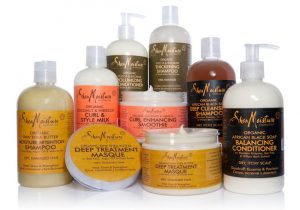(ThyBlackMan.com) According to the New York Times, Last week, the hair-care line SheaMoisture faced a powerful customer backlash. The offense was a series of online video clips that highlighted the versatility of the brand’s shampoos, conditioners and styling aids.
One clip features women discussing how much they struggle with their hair. Some of the women are white; the only non-white woman prominently featured in the clip is very light-skinned with loosely textured curly hair. The ad encourages women to reject “hair hate” and “embrace hair love in every form.”
When the video was released on social media, SheaMoisture’s black customers revolted. Social media users with huge followings, many of whom have provided years of free advertising for the brand, criticized it as marginalizing their loyal black buyers in an effort to attract white women.
Understanding SheaMoisture’s target market is critical to understanding this backlash. The brand has long been marketed to black women with “natural hair” — hair that is not chemically straightened. For black women, the choice to “be natural” is simultaneously private and extremely political. It shouldn’t matter what black women do with their hair, but racism means that it matters a great deal. Deeply ingrained bias against black women’s natural, unstraightened hair has tangible effects on women’s lives. Lighter-skinned black women and black women with straighter hair are more likely to marry than other black women. Black women with natural hair have been subject to discrimination at work and in the military.
When black women bought SheaMoisture products, they were rejecting powerful stereotypes about black women’s hair as inherently unattractive. Unwittingly or not, SheaMoisture was part of a political project for black women, helping us resist harmful biases about our natural hair that circumscribe our choices and well-being.
But Sundial Brands, the black-owned company that runs SheaMoisture, has its own goals. In 2015, it company sold a minority stakee to Bain Capital to finance an expansion. At the time, Richelieu Dennis, the chief executive of Sundial, said SheaMoisture would be pursuing the “new general market,” which he described as a “consolidation of cultures, ethnicities and demographics aligned with commonalities, needs and lifestyles.”
To believe it is possible to diversify SheaMoisture beyond its black natural-hair customer base, one must believe that black beauty is desirable for non-black consumers. SheaMoisture could not sell a product meant to make black women look “whiter,” such as a chemical treatment to straighten hair, without changing its entire product line. But it could concede to the demands of capital by marketing its existing products to non-black women. SheaMoisture eventually apologized, acknowledging the insult many black women felt. By prominently featuring white women in what had become a political project, the company had signaled to black women that we could never be enough.
Shea Moisture makes hair and body products that are great favorites with black women. The company, founded by a mother and son team with roots in Sierra Leone, decided to expand to other markets and did two things: it allowed Bain Capital to become a minority investor in it and it engaged a marketing team that made a huge marketing mistake that offended its core base with a short-lived commercial. The spot that featured two white women and a very fair-skinned black one talking about how they hated their hair. Backlash from loyal customers ensued. Apologies from Shea Moisture swiftly followed. Too late? Does All Hair Matter? We’ll see.
Staff Writer; Amber Ogden
One may also view more of her work over at; AmberOgden.com.
Also connect via Instagram; 1amberogden and Twitter; MsAmberOgden.

















Leave a Reply